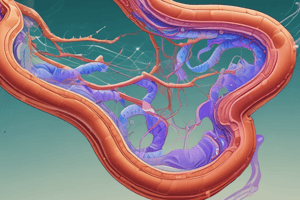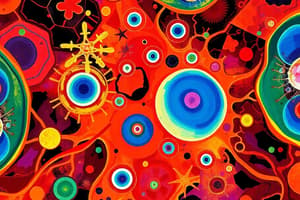Podcast
Questions and Answers
What is the literal meaning of the word 'biology'?
What is the literal meaning of the word 'biology'?
- Life and study (correct)
- Science of life
- Study of living things
- Unified science
What is a characteristic of unicellular organisms?
What is a characteristic of unicellular organisms?
- Can only be seen using a microscope (correct)
- Found only in plants
- Made up of multiple cells
- Can be seen with the naked eye
Which of the following is an example of a physiological adaptation?
Which of the following is an example of a physiological adaptation?
- Human body temperature (correct)
- Bird migration
- Hare ear length
- Plant orientation towards the sun
What is the term for the ability of an organism to maintain a steady internal environment?
What is the term for the ability of an organism to maintain a steady internal environment?
What is the branch of biology that studies fish?
What is the branch of biology that studies fish?
Which of the following is NOT a characteristic of life?
Which of the following is NOT a characteristic of life?
What is the term for the set of chemical reactions that convert 'food' into energy?
What is the term for the set of chemical reactions that convert 'food' into energy?
According to Kirchoff's laws, what is a characteristic of a black surface?
According to Kirchoff's laws, what is a characteristic of a black surface?
What is the main focus of Ornithology?
What is the main focus of Ornithology?
What is the term for the build-up of chemicals or toxins in living things?
What is the term for the build-up of chemicals or toxins in living things?
What is the branch of biology that deals with the study of hereditary and genetic material?
What is the branch of biology that deals with the study of hereditary and genetic material?
What is the study of the relationships between all life forms and their environment in a particular area?
What is the study of the relationships between all life forms and their environment in a particular area?
What is the scientific attitude that involves being open to new ideas and learning?
What is the scientific attitude that involves being open to new ideas and learning?
Who is considered the 'Father of Biology'?
Who is considered the 'Father of Biology'?
What is the study of the structure and organization of living things?
What is the study of the structure and organization of living things?
What is the term for the process by which non-living materials turn into living things?
What is the term for the process by which non-living materials turn into living things?
Flashcards are hidden until you start studying
Study Notes
Biology Overview
- Biology is the science of living things, an unified science that combines biology, chemistry, and physics.
Characteristics of Life
- Cellular Composition: living things are made up of at least one cell.
- Types of Cellular Composition:
- Unicellular: one cell, only visible using a microscope (e.g., bacteria, amoeba, paramecium).
- Multicellular: more than one cell (e.g., plants, fungi, animals).
- Growth: increase in cell size or cell number.
- Reproduction:
- Asexual: cell division (mitosis), one cell becomes two (e.g., bacteria).
- Sexual: union of sex cells (sperm and egg cells), seen in plants and animals.
- Movement:
- Place to place: bear running, birds flying.
- External part: phototropism, plants orient leaves toward the sun.
- Internal part: cytoplasmic streaming.
- Adaptation:
- Changing to meet the needs of the environment (e.g., bird migration, human body temperature).
- Metabolism: set of chemical reactions that convert "food" into energy (e.g., glycolysis, Krebs cycle).
- Specific Organization: certain parts do specific jobs (e.g., heart, nucleus, chloroplasts).
- Homeostasis: maintaining the same state (e.g., water balance inside and outside of cell, human body temperature).
- Responsiveness: reactions to various stimuli (e.g., light, heat, pH, vibration).
Kirchoff's Laws
- White: good reflector, poor radiator (heat is lost slowly).
- Black: good absorber, good radiator (heat is lost quickly).
Branches of Biology
- Zoology: study of animals.
- Ichthyology: study of fish (fish are indicator species, alerting humans to potential environmental problems).
- Mammalogy: study of mammals (e.g., NASA).
- Ornithology: study of birds.
- Botany: study of plants (e.g., food production, medicines).
- Microbiology: study of small life (e.g., medicines, bioterrorism).
- Anatomy: study of an organism's parts.
- Physiology: study of how organism's parts work (e.g., health professions, veterinarians).
- Entomology: study of insects (e.g., West Nile virus, Yellow Fever - carried by mosquitoes).
- Genetics: study of hereditary and genetic material (e.g., DNA/RNA, chromosomes, genes).
- Ecology: study of all life in a particular area, the relationships between those life forms and the environment (e.g., AMD, overpopulation, ozone depletion/greenhouse effect, rainforest destruction).
- Cell Biology: study of cells.
Biology as a Science
- Three science perspectives: teacher, student, and person on the street.
- Scientific Attitudes:
- Careful Judgement
- Desire to Learn
- Cause and Effect
- Concern for Human Welfare
- Science Examples:
- Galileo's sun-centered universe vs earth-centered universe theory
- Peace Corps and vitamin A shots
- Spontaneous Generation: non-living materials cannot turn into living things.
Biology Pioneers
- Aristotle: Greek philosopher, considered the "Father of Biology".
Studying That Suits You
Use AI to generate personalized quizzes and flashcards to suit your learning preferences.




